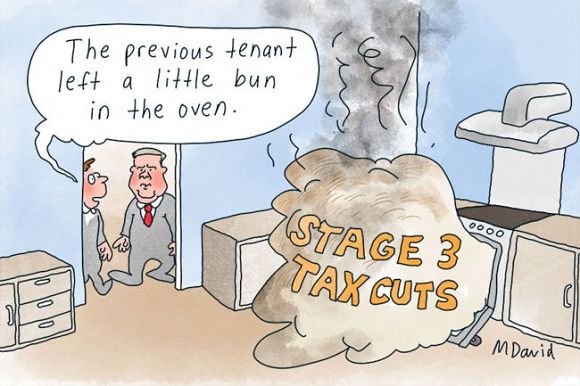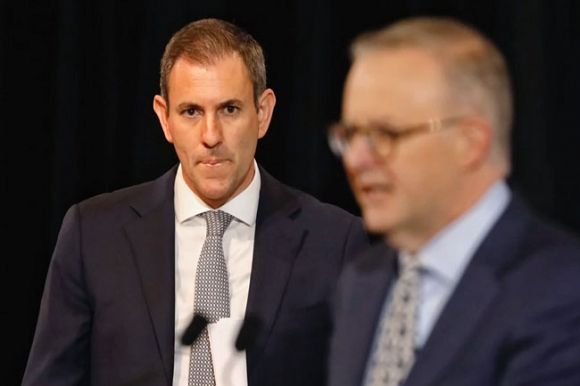A brawl over Australia’s tax collection policies has erupted between two giants of global economics, reports Alan Austin.
*Also listen to the audio version of this article on Spotify HERE.
NOBEL PRIZE-winning economist Joseph Stiglitz has launched a stinging attack against the Organisation for Economic Cooperation and Development (OECD). The dispute centres on current Australian anti-tax avoidance legislation.
Joseph Stiglitz is a professor of economics at Columbia University in New York and co-chair of the Independent Commission for the Reform of International Corporate Taxation (ICRICT). He was chief economist of the World Bank in the late 1990s and, before that, chair of the Council of Economic Advisers serving U.S. President Bill Clinton.
He has been quoted as an authority on fiscal policy many times by this column and features prominently in lists of economists who have affirmed the effectiveness of Australia’s stimulus response to the global financial crisis.
This column also frequently references the OECD as the body which coordinates economic policy among its 38 wealthy, capitalist member countries. It has a long record of advocacy for poverty alleviation and against tax evasion, and is an invaluable source of global economic data. (So it is somewhat bizarre to report on a clash between two highly venerated authorities.)
At the centre of this brouhaha is Australian legislation, passed last month with the daunting title:
‘Taxation Laws Amendment (Measures for Future Bills) Bill 2023: Multinational Tax Transparency, Tax Changes.’
Stiglitz and another ICRICT co-chair, Professor Jayati Ghosh of the University of Massachusetts, have attacked the OECD for its "duplicity" when it ‘pressured the Australian government to weaken critical transparency requirements for multinational corporate taxation’.
The OECD has hit back, describing the criticisms as "false". OECD chief Mathias Cormann, a former Coalition finance minister in Australia, has emphatically denied he pressured the Albanese Government.
Brief background
The dispute became public with a 7 July article in the prestigious London-based Financial Times (FT) headed, ‘OECD pressed Australia to drop plan to reveal where multinationals pay tax’.
The FT article, written by three senior reporters, claimed the OECD:
‘Helped persuade Australia to water down a law that would have required thousands of multinationals to publicly say where they pay tax.’
It quoted an unnamed person “close to the decision” asserting:
‘There was heavy, heavy opposition from the OECD to the bill and that was one of the critical factors behind the decision to pull back from the measure.’
The article concluded with an observer noting it was ‘not a good look for a Labor government to be seen to be taking indirect orders from a Liberal finance minister’, referring to Mathias Cormann.
The Stiglitz letter
The Financial Times then published a scathing letter from Joseph Stiglitz and Jayati Ghosh which condemned the OECD’s failures to support effective anti-tax evasion efforts. It included:
‘We grew especially worried in 2021 after the OECD released their anaemic proposals, which are expected to provide minuscule sums to developing countries and emerging markets in return for holding off imposing digital and other taxes on multinationals.’
The letter accused the OECD of designing reforms ‘tilted in favour of its members, advanced countries, and the corporations in them’ and concluded that:
‘The reported attempts of the OECD in Australia to actively undermine efforts to increase transparency confirms we were right to worry.’
Response from the OECD
A statement from Secretary-General Cormann replied that reports ‘that he had pressured Australia into weakening planned legislation to tackle multinational tax avoidance are false. The opposite is true'.
Cormann explained that the OECD is striving to strengthen efforts of tax administrations that need efficient access to tax information:
‘It is in this context that OECD experts raised a number of technical issues that could be raised by international partners and also discussed possible unintended consequences, including that adopting the Bill could cause some of Australia's partners to cease the exchange of country-by-country reports with Australian tax authorities.’
Australian Government position
IA contacted the Treasurer’s office for its explanation and was advised by Assistant Treasurer Andrew Leigh that part of the Government’s multinational tax integrity package ‘which aims to ensure multinationals pay their fair share of tax in Australia’ was introduced to Parliament last month.
Leigh acknowledged that ‘the start date for country-by-country reporting has been deferred by 12 months to allow further time to engage with stakeholders on the reforms'.
So who is in the right here?
One problem for the OECD is that current chief Mathias Cormann has a record of shielding tax avoiders. During his time as Australia’s finance minister, tax evasion proliferated, as shown by the annual tax transparency reports, and many years of weak corporate tax revenue.
An October 2020 analysis in IA critical of Cormann’s candidacy for the OECD top job claimed that:
‘Of all finance ministers of the 37 [then] member nations, Senator Cormann almost certainly has the worst record. That’s based on several measurable outcomes.’
A scathing assessment by Professor John Hewson of the ANU Crawford School of Public Policy, who is also a former Coalition opposition leader, described Cormann’s strong personal conservative views in favour of lower taxes and smaller government:
‘Such views were essentially ideological, based more on prejudice associated with the Coalition myth of being “better economic managers” than any hard research ...’
Cormann also has a record of not telling the truth, as demonstrated in many analyses during his career as finance minister.
In his reply to IA defending the latest law changes, Assistant Treasurer Leigh affirmed that they ‘will increase tax revenue and improve tax transparency’.
This is how we will know. We shall see from future tax transparency reports and tax revenue records. IA will continue to monitor these closely.
*This article is also available on audio here:
Alan Austin is an Independent Australia columnist and freelance journalist. You can follow him on Twitter @alanaustin001.
Related Articles
- Contrary to Coalition claims, business is booming across Australia
- Albanese Government must take action against Robodebt masterminds
- Australia's cruel deportation laws forsake dying father
- Labor can manage the economy, now let’s fix the inequalities
- Chalmers talks up 'well-being' budgets, but Labor still needs to deliver
 This work is licensed under a Creative Commons Attribution-NonCommercial-NoDerivs 3.0 Australia License
This work is licensed under a Creative Commons Attribution-NonCommercial-NoDerivs 3.0 Australia License
Support independent journalism Subscribe to IA.














